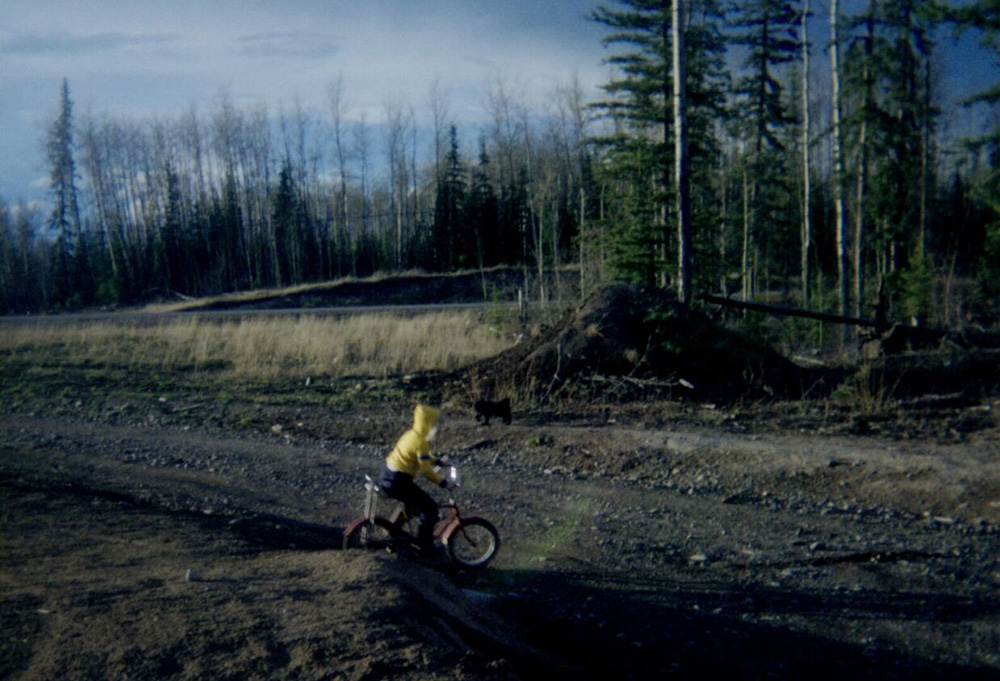[Editor’s note: Read today’s Tyee interview with Carla Funk, the decorated poet who grew up Mennonite in Vanderhoof and is now writing a memoir, from which this is drawn.]
In the musty heat of the canvas tent, I sit brushing Malibu Barbie’s shiny blonde hair, wishing for a gun. Outside, through the trees and in the yard, my brother and the neighbour boys tear around, their weapons slung across their backs as they dodge back and forth across enemy lines. Instead of fighting alongside them in their war game, I listen to Carrie and Bonnie invent reasons for the Barbies to change their clothes. A doctor’s appointment. A meeting at the bank. They flex and twist their dolls’ arms and legs, snapping and unsnapping skinny pantsuits, pencil skirts and flouncy gowns. A surprise birthday party. A horse ride on Dixie, the dream pony. A trip to the grocery store. They chatter happily, as if these storylines are the only ones worth following.
“Girls! Girls your age!” my mother declared when a family with two daughters moved into the empty house down our rural road. Within days of their arrival, she introduced herself to the new neighbours, and invited the girls for an afternoon of play. Up our driveway, the pair came, each carrying what looked like a miniature suitcase.
“We brought our Barbies,” they said. The brightness in their voices made me wary. Carrie, in a pink-and-white-striped T-shirt with matching pink shorts, was tall and thin, dark-haired. Her younger sister, Bonnie, wore the same short set in red. They seemed to have walked out of the pages of the Sears catalogue, clean and combed and glossy, smiling and without guile, the kind of girls who made me feel uneasy, awkward in my girl-ness.
I led them to the cabin tent my mom had erected on a flat patch of grass beside the garden — “Like a playhouse!” she said. Once inside, we sat in a triangle, facing each other, waiting for something to happen.
I reached for the green mosquito coil smoldering in the corner. “Smell this.” I held it up to them for a sniff.
Carrie and Bonnie pinched their noses and drew back. “Ew!” said Bonnie. “It stinks!”
“It’s poison,” I said, with triumph. “If you eat it, you’ll die.” Neither girl seemed impressed.
Carrie unclasped the metal buckles on her case, and opened it to reveal a nest of dolls and dresses and tiny plastic accessories. “Let’s play,” she said, and handed me a Barbie in a turquoise swimsuit. “This one has her own sunglasses and everything,” she said. “You can be her.”
A shared code
I was used to being one girl in a pack of boys, following like a dog behind the hunters, crashing through the bush of our back acres, searching out the enemy. My brother and the other boys from our rural neighbourhood — Kenny and Gordy from through the trees, Marvin from Poplar Road, Santana and Ira, the scary Sinclair brothers — dictated the terrain and the kind of war we waged, whether on foot within the boundaries of the yard and its outbuildings — garden, pigpen, tree fort, garage — or off into the wild on kid-sized motorbikes.
We fought by a shared code, rules of war concocted after much consideration. No sissy time-outs. One gun per player, plus whatever grenades — pinecones and dried mud clots — you could carry. We built our guns by hand. A scrap of lumber tossed on the burn pile became the body of a gun, sanded smooth to stave off slivers. A length of old pipe or rebar got hacksawed into a barrel and scope. With the drill press in our dad’s shop, my brother fit the barrel to the frame, polishing the metal until it shone. Finally, with a ballpoint pen, we inked the make and serial number into the wood, registering every weapon in our cache.
Each gun had its own noise, depending on the model. From the stuttered nasal eh eh eh eh eh of the semi-automatic, to the low, plosive front-teeth-tucked-inside-the-bottom-lip fire of the submachine gun, to the high-pitched volley and descent of the tossed explosive, our battlefield noises defined us. The ferocity and authenticity of the sound effect contributed to the soldier’s credibility and threat. For the boys, the noises came naturally, as if they’d been born with mouths formed for the violence of this music. They shifted with ease between weapons, from Uzi to sniper rifle to Magnum .44, their spit flying as they fired. No matter how much I practiced the kackackackackackackack of my AK47, my bullet stutter never was as loud and powerful as theirs, but it seemed enough to keep me in the war.
I’d be on my belly, army-crawling over the forest floor, wet dirt caked on the front of my shirt, camouflaged by the stinkweed and saplings, when ahead, from behind a stump, an enemy popped up, surveying for movement. If I stilled myself, ignoring the black flies that wheedled around my head, if I held my breath and made myself a stone, my enemy might move on, veer down some other trail blazed through the birch and poplar. But if I shifted the wrong way, snapped a twig, sniffed too loudly or swatted at the insect swarm, the gun found me. One way or another, whether by Marvin’s fully-automatic dakkadakkadakka or by Gordy’s pew pew pew, I was done, it was over. After the shooter yelled, “You’re dead!” I lay on my back, eyes closed, clutching my imaginary gut wound as I bled out, and started counting to 100, the only way to bring myself to life again, and back into the battle.
‘Don’t move’
It was Kenny’s idea to introduce hostage-taking to the game. “It’ll be like real war,” he said, “like in Russia or Yugoslavia.”
“Or like how 007 gets captured and tied up,” said Gordy, Kenny’s little brother. He yanked up his T-shirt. “For your eyes only!” he said, and flashed his scrawny chest, then began to laugh so hard, he fell to the ground and pounded the dirt with his fists.
With a stick, Kenny dragged an X in the clay to mark our start, and then explained the new rule of engagement. In real war, soldiers didn’t just automatically shoot the enemy dead. In real war, soldiers took people prisoner and held them at gunpoint until someone rescued them, or they got killed. “It’ll be fun,” he said.
After we picked our teams — Gordy and me, the youngest, left at the end to choose each other, we bolted from the X, scattering in all directions to race down trails and through the trees, leaping stumps, brush and thistle, singing in our heads — one Mississippi, two Mississippi, three — counting down toward the opening of war, I found a deadfall log to crouch behind. As I cooled my thumping heart and slowed my breathing, I scanned for enemies ahead, my assault rifle propped and ready to fire. The brush behind me crackled with someone’s footsteps.
“Hands in the air,” the voice said, and knocked the tip of his barrel against my shoulder. “Stand up!”
When I turned around, Kenny was grinning, triumphant over me, the war’s first prisoner. I was his, he said, his hostage, and I’d be the bait to bring in a rescuer so he could kill him, too. Kenny marched me toward the tree fort, headquarters, prodding me every few feet with his gun, telling me to keep quiet, or else.

In the bottom floor of the tree fort, as Kenny wound old rope around my hands and feet, I felt the strange thrill of the unknown, but a little fear, too, at how real it all felt — the rope scratching my wrists, a strip of cloth tied as a gag over my mouth. Kenny pulled down the rope ladder and clambered up to the top storey.
He looked down at me through the hole in the floor, before letting the trap door shut. “Don’t move,” he said. “Or else.”
Or else what, I didn’t know, but his voice held the threat of a growl. Boys could do that with their voices, could make them go low and menacing so other boys perked up and girls backed down. Boys were stealthy as foxes, agile as rats. They climbed with an ease I longed to possess, up trees, ropes, ladders, forever up and up. They rode full-throttle to the crest of a hill they called Kamikaze, and left me in the gulley. In winter, they stood at the top of the snow pile and taunted, You’re no king of the castle — you’re a girl. No matter how many times I tried to reach the peak, one of them—Kenny, Marvin, Ira, my brother — sent me back down to the bottom.
Girls at the bottom, boys on top. Girls on this side, boys on the other. I had begun to notice the line drawn between us, to see that it was darkening, deepening into a trench. On the playground, at the bus stop, at Sunday school choir practice, the girls clustered in their own giggling world, while the boys huddled together, talking and laughing over jokes. I craned to hear from the outskirts, suspicious that I was missing out on something important, some secret that could crack the system’s code. But the whole system seemed built on a broken foundation. Everywhere I looked, I saw the widening split.
At our church-run school every Friday afternoon, all the students divided into groups for what the teachers called “Arts and Crafts.” We girls funneled into age-appropriate activities like macramé, crocheting, embroidery, and other domestic arts. While the boys took part in outdoor survival, learning how to set a trap, build a snow shelter, and start a winter fire with only one wooden match, I sat in a semi-circle of girls in a quiet room indoors, watching our volunteer craft leader, one of the church grandmas, demonstrate basic cross-stich. How to thread the needle. How to read the pattern’s design. How to sew a row of diagonal stitches, then double back and make them into a chain of X’s. I bent over the gingham fabric held taut inside the embroidery hoop, and drew the needle up and down, cross-stitching the tiny cells, X on X, like all the other girls.
More than the scent of Love’s Baby Soft perfume, I loved the whiff of sulphur-smoke wafting from the cap gun’s barrel. More than the crochet hook, the pocketknife, and how it whittled a willow branch to a perfect spear. I played the games that most girls liked — house, office, beauty salon — but tired quickly of their scripts. Always, the house needed cleaning and the babies needed changing. The secretary answered the telephone for her boss. The hairdresser said, “I have just the style in mind!”
All the way back to Genesis and that first garden, my future seemed rigged. I tried to count my ribs to see if the story was true — that I’d been made the same as Eve, fashioned from a borrowed rib. Had the Creator’s hand really reached down to Adam’s sleeping body and unclipped one from its cage? I imagined God stewing that bone in the dust until it gathered steam, His breath like magic on it, and then in a whirl of mist, poof! — a woman. But I always lost track in my counting, and could never figure out how many ribs made up a girl.
I didn’t want to be a boy; I only wanted entry to a boy’s world. Full access. To do without restraint what boys could do. I wanted to shoot the moose, kindle the fire, rev the engine, and then come home to my pink-walled room, flop on my bed, and crack open my Trixie Belden mystery to see what clues the girl detective might sleuth out to solve the secret of the haunted mansion. I wanted to erase the line scuffed in the dust, and go back to the beginning before the world split in two. I wanted to pull from my body the borrowed rib and give it back, or better yet, for that borrowed rib to mark me as one of a band of brothers — and sisters, all of us built from the same breath and blood, bone of the same bone, flesh of the same flesh.
In the dark
The war went on without me in the field. Above me, Kenny fired his M-16 — a vocal barrage of bullets — and launched explosives out the window with a shrill whistle and subsequent kaboom! When Gordy tried to get close enough to the tree fort to spring me loose, Kenny pulled an all-out assault. Through a knothole in the wall, he let loose a stream of urine, peeing on his little brother as he passed below, which triggered the other boys to raucous laughter, and sent Gordy raging back at them with a stick-turned-machete, hacking at their backs, and left me in the dark.
Whatever thrill I’d felt at the start had fizzled. I was the only prisoner, which seemed boring and unfair. I was the only tagalong straggler, too, the lone girl added to the pack because no one gets left out, so said my mother, even when my brother huffed and rolled his eyes, and argued for his freedom. For now, he had to take me with him into the wild world of boys, but in my hostage state, I felt it — that world tilting, shaking me loose from its adventure, and sending me to the other side of the dividing line.
Though the rope cinched around my wrists and ankles was thin and frayed, though I surely had enough muscle to break free of my makeshift chains, stand up, kick open the door on its flimsy hinges and bolt through the trees with my weapon ready, bolt for the hill and race to the top, to claim it, call it mine, my new ground, I didn’t even try. No one had talked of escape as an option. I hunkered in the windowless dungeon of the tree fort and waited for rescue, or someone’s mom to call out, Suppertime! — and send us all back home.
Matching
Inside the sun-cooked tent, with the screen door zipped to keep out bugs, we ready our dolls for an evening on the town. Bonnie stands her Barbie up and wiggles the doll back and forth. “I need a new hairdo,” she says, her voice high and breathy. She digs through the pile of accessories and pulls up a tiny plastic mirror. She fits it into the hand of her Barbie, who holds it up to her face.
Carrie fits her doll’s feet, forever fixed on tiptoes, into a pair of silver heels. “To match her silver dress,” she says.
We girls play out our story, shadows of a sisterhood more ancient than we know, of tents alive with other girls who sit inside and wait for a voice to call them out, for the broken world to reconcile, girls who sat inside and peered through the opening to see the moon and the path in darkness by which the men came home to them, carrying the meat and blazing torches.
I keep brushing my borrowed Barbie’s plastic golden hair, listening for what comes next.
Outside, from the trails cut through the forest at our backs, my brother and the boys yell their war. Laughter from the bushes. Gunfire from the trees.
Part two: “All the Ways to Fall: Memories of a Stubborn Girl.” ![]()
Read more: Gender + Sexuality, Media


















Tyee Commenting Guidelines
Comments that violate guidelines risk being deleted, and violations may result in a temporary or permanent user ban. Maintain the spirit of good conversation to stay in the discussion.
*Please note The Tyee is not a forum for spreading misinformation about COVID-19, denying its existence or minimizing its risk to public health.
Do:
Do not: